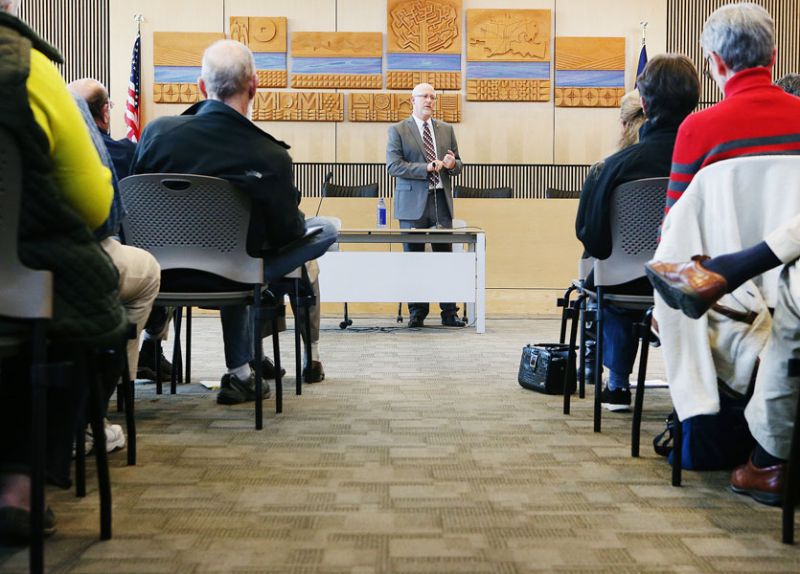Ron Noble: Triumphs, disappointments from first legislative session
About 18 months ago I announced my campaign for House District 24. As I traveled the district, everywhere from McMinnville to Carlton and Hillsboro, the message I continually heard was the same: We are tired of Salem politicians recklessly kicking the can down the road on our state’s most challenging problems. Throughout my first legislative session as a state representative, I am proud to tell you I have worked hard on your behalf and I have brought my local government outsider perspective to the challenges we face as a state:
* I was the chief sponsor of a bill in the House that protects our kids’ school funding from political games. The bill would prioritize funding to schools first and foremost before discussing other funding measures.
* I led the charge on a legislative amendment to restore funding to the Department of Veterans Affairs after a proposal emerged to cut funding voters approved with the passage of Measure 96.
* I advocated for the passage of a transportation funding package that will be used for highway and bridge improvements, transit projects and more around our district and state. This is a crucial funding package for economic development in Oregon. Unfortunately, the 2017 legislative session will be remembered by many as one of missed opportunities. Not that good things were not accomplished — there were — but even our best successes were overshadowed by the unwillingness of our state leaders to make a sincere effort to put our state’s financial house in order. The weight of decades of runaway spending poses a serious risk to our ability to adequately fund our schools, health care programs and other core services. It does not take a mathematician to realize that when state spending is increasing far more rapidly than revenues are growing, eventually you are going to run into a problem. To address our state’s budget woes in a comprehensive manner, I, with many other Republicans, supported a three-step approach that consisted of:
* Development of a clear strategy for maintaining economic growth over the next decade. This requires agreement on a target economic growth rate and increasing well paid jobs, and a commitment to conform state policy to those ends.
* Delivery of structural spending reforms that result in significant long-term savings.
*n Targeted investments in career and technical education and workforce development programs that both support economic growth and fulfill the objectives of our voters, which could be funded by new revenues as needed. Unfortunately, this balanced approach gained little traction. Even amid record tax revenues, many insisted our state’s main problem was a lack of revenue and resources, ignoring the fact that Oregonians have witnessed their taxes increase 48 times in the last decade. Several legislators sought to pass a massive, multi-billion dollar tax on Oregon sales very similar to the scheme proposed by Measure 97 last November. Fortunately, even with a strong push during the closing days of the session, this effort to thwart the will of the voters stalled.So, Oregon lawmakers adjourned the 2017 legislative session without taking any meaningful action to address runaway spending and to put the state on the path to a stable financial future. When the final gavel came down July 7, one could hear the disappointing sound of a can being kicked down the road — yet again. The 2017 session was, in many respects, a session of missed opportunities. But there were some successes. As mentioned above, Republicans and Democrats were able to unite in order to pass a transportation package in the closing days of the session. The package included $5.3 billion in funding for preservation and maintenance of roads and bridges as well as congestion relief projects. We secured modifications to the low-carbon fuel standard to protect consumers, and we strengthened accountability and oversight of transportation agencies.
Although the package includes $22 million for design of Phase II of the Newberg-Dundee Bypass, I believe the best part of the bill is the additional transportation funding for our counties and cities. It was dispersed throughout the state based on a formula determined by the number of registered vehicles and miles of road in the counties. This part of the bill will be a significant help to rural areas, including Yamhill County and Southern Washington County, with an estimated additional $70 million of funding for county roads and city streets in House District 24 over the next decade. That’s $70 million worth of improved transportation infrastructure, jobs and economic development for the Yamhill County area.
Much more went on in Salem over the last six months, and I look forward to discussing these issues during my upcoming town hall events scheduled for the Chehalem Cultural Center on August 8, and the McMinnville Civic Hall on August 16.
Thank you for your support, encouragement and even criticisms, knowing that in this business, there are many views on the issues at hand. It has been an honor to serve you in the Legislature.











Comments